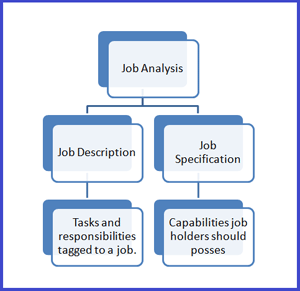1. Task: an identifiable work activity carried out for a specific purpose. For example, typing a letter.
2. Duty: several tasks which are related by some sequence of events. For example, pick up, sort out and deliver incoming mail.
3. Position: A collection of tasks and duties which are performed by one person. For example, the P.A. to Chairman receives visitors, takes dictation, operates computer, answers queries, attends to complaints and helps students.
4. Job: A group of positions similar in their significant duties. For example the job of salesmen, technical assistants, computer programmers, etc.
5. Job Families: Groups of different jobs that need similar skills. For example, sales jobs and clerical jobs in different departments.
6. Job code: A job code uses numbers, letters or both to provide a quick summary of a job and its content.
7. Job Classification: The grouping of jobs on some basis such as the nature of work done or the level of pay. For example, skilled, semiskilled and unskilled; Grade II and III officers in a Bank.
8. Job Analysis: The process of gathering information about a job.
9. Job Description: A written summary of tasks, duties and responsibilities of a job.
10. Job Specification: the minimum skills, education and experience necessary for an individual to do a job.
11. Job Evaluation: A systematic procedure for finding the relative worth of a job.
12. Job Sharing: It is a scheduling innovation that allows two or more workers to share a job.
13. Job Design: A conscious effort to organize tasks, duties and responsibilities into a unit of work to achieve a certain objective.
14. Job Rotation: Moving employees horizontally or vertically to expand their skills, knowledge or activities.
15. Job Enrichment: Adding more responsibilities, autonomy and control to a job.
© 2024 Human Resource Management. All rights reserved. Site Admin · ·
Powered by HRM Practice · Designed by HRM Practice


 Follow
Follow